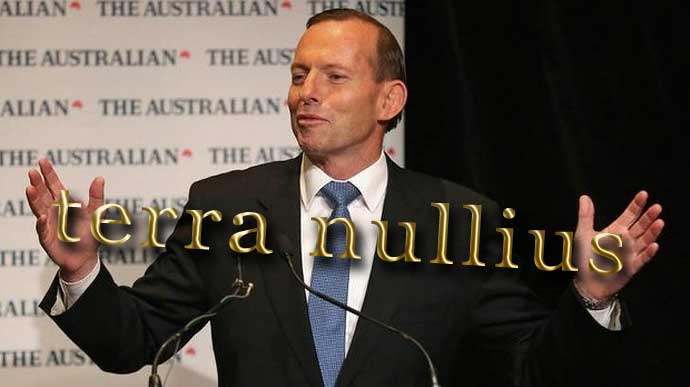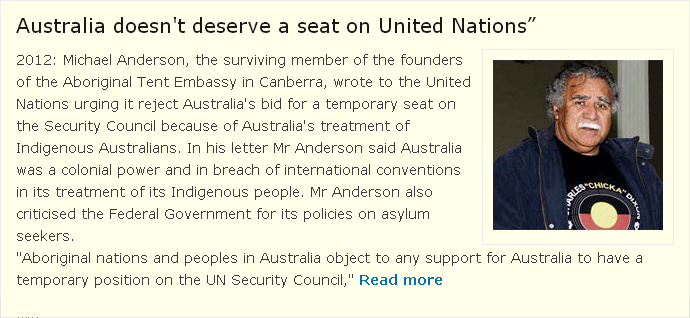Questioning Australia's legitimacy to sit on the security council

Trapped in concentration camps in our own country

28 October 2014
Ghillar Michael Anderson sent an Open Letter to all UN Ambassadors in New York to highlight Australia's questionable legitimacy on the UN Security Council and to draw attention to Australia's return to the 1920s white colonial Aryan rule.
Australia is now a country where there are no judicial reviews possible against a form of military rule over its own population and in particular First Nations Peoples.
28 October 2014
Ambassador to United Nations
Your Excellency
Re: Questioning Australia's intentions and legitimacy in respect to its participation in the UN system, when it is not bound by the UN Charter
As subjugated Nations and Peoples in Australia, we express our gravest concerns for our wellbeing as Peoples, who hold the oldest living cultures in the world.
Previous correspondence has provided some insight into our plight within Australia and our past historical experiences under British and Australian colonialism. Now alarm bells are ringing once again, suggesting a new vicious onslaught against us, which in so many ways fits the elements of genocide.
Our concern is the high-ranking status that the United Nations gives to Australia, and in particular, Australia's presence on the Security Council.
A desktop study of submissions from NGOs to the various UN treaty bodies, eg. Committee for the Elimination of All Forms of Racial Discrimination, Committee on Economic, Social and Cultural Rights and Human Rights Committee illustrate Australia's ongoing violations against First Nations and Peoples along with breaches of international laws, as they relate to human and civil rights.
The recent upsurge of mistrust of what is called the 'international terrorist threat' witnesses Australia's unreasoned policies and law-making that makes Australia a police state through the abandonment of human, civil and political rights. This has been achieved through fear mongering within the populace, fuelled by the Murdoch press.
It should be noted that the current Commonwealth government has mastered the use of social analysts, who identify to the government that 47% of the current Australian population escaped the tyranny of oppression and subjugation in their former homeland, and that they themselves escaped by immigrating to Australia, where they found a country apparently free of military controlled governments.
This current Tony Abbott government understands that promoting a campaign of terrorists lurking in the shadows, permits them to convince people to give away to the erosion of their human rights and civil liberties, under the guise of 'protecting our society. But when we examine the new police powers and the invasive seizing and search powers given to state police, Australia is now governed by a police state in the true sense of the word and Aboriginal people are more at risk than ever.
As a burgeoning national unity instrumentality, through our pre-existing and continuing sovereignty and our right to exercise self-determination, the Sovereign Union has been working at the very grassroots of various Aboriginal Nations, enabling them to rise above the repression of tyrannical Australian governments.
Our cultures dictate that where people are being hurt and their wellbeing severely injured, amicable settlements to major disputes cannot be solved by hate, anger and aggression. Our culture requires us to rise above this and attempt to locate solutions without creating more harm.
In recent years Aboriginal Nations have been attempting to make the final moves to exhaust all legal and political avenues within the Australian 'domestic' sphere to settle our 226 year dispute between our rights as First Nations and Peoples and the British colonial state of Australia. Some Nations have already made their Unilateral Declarations of Independence.
We express serious alarm when Supreme Court judges of the Australian states are unable to give unqualified legal judgments to legal disputes. Of particular concern for the UN is the case Ngurampaa Ltd v Balonne Shire Council [2013/00021824] in the Supreme Court of Queensland, Justice Philippedes' accepted Balonne Shire's assertion that Australia is not bound to the UN Charter, as determined in the Bradley v Commonwealth High court case [Bradley v Commonwealth ("Rhodesian Information Centre case") [1973] HCA 34; (1973) 128 CLR 557 (10 September 1973)]
On 30 April 2014 Mr M. P. Amerena, of King and Company Solicitors, Counsel for the Balonne Shire Council stated in his outline of argument in the Rates Dispute Case, where we challenge the right of the Shire to levy rates against members of the Euahlayi Nation on their own land and for which the Shire cannot show how it gained legitimate land title from the original Euahlayi Allodial title:
In any event, the Charter of the United Nations does not have force of law in Australia; see Bradley v The Commonwealth and Joosse v ASIC. See also Minister for Foreign Affairs v Magno. In short, the content of the Charter has not been carried into effect within Australia by appropriate legislation. The better view is that what is now s.5 of the Charter of the United Nations Act 1945 serves only for the purposes of international law, to ratify Australia's participation in the United Nations. [para 30]
The Commonwealth of Australia's Charter of the United Nations Act 1945, as amended in 2010, appears to bring the international law into domestic law. Section 5 states clearly:
Part 2—Approval of Charter
5 Approval
The Charter of the United Nations (a copy of which is set out in the Schedule) is approved.
But in the case law that the Balonne Shire relies upon, Bradley v Commonwealth ("Rhodesia Information Centre case") [1973] HCA 34; (1973) 128 CLR 557 (10 September 1973), Chief Justice Barwick along with Justices Gibbs and Stephen stated the rationale for the decision (ratio decidendi) which is binding on lower courts. The Commonwealth Law Report summary states:
Barwick CJ with Gibbs and Stephen JJ held that Section 3 of the Charter of the United Nations Act 1945 did not make the Charter binding on persons within Australia as part of the municipal law and neither the Charter nor the Resolution of the Security Council had been carried into effect by legislation in Australia. Hence they could not be relied upon to justify executive acts or resist an injunction to restrain an excess of executive power. [NB: Section 3 is now Section 5]
Alarmingly, this assertion permits a dictatorial tyranny to rule in Australia.
The judgment of Chief Justice Barwick and Justice Gibbs states that the UN Charter is merely "approved":
The Parliament has passed the Charter of the United Nations Act 1945 (Cth), s. 3 of which provides that "The Charter of the United Nations (a copy of which is set out in the Schedule to this Act) is approved". That provision does not make the Charter itself binding on individuals within Australia as part of the law of the Commonwealth. …
Section 3 of the Charter of the United Nations Act 1945 was no doubt an effective provision for the purposes of international law, but it does not reveal any intention to make the Charter binding upon persons within Australia as part of the municipal law of this country, and it does not have that effect.

This conundrum is further expressed in the Federal Court case Minister for Foreign Affairs v Magno 1992, which focuses on the demountable shed placed by East Timorese on the lawns of the Indonesian Embassy in Canberra after the Dili massacre in 1991. Gerardo Magno challenged the validity of amendment 'SR No. 7' (Statutory Regulation No. 7) to the Diplomatic Privileges and Immunity Regulations purportedly signed by the Governor-General Bill Hayden1 on 15 January 1992.
In this case Justice Gummow compares the binding nature on Australian domestic law of the Vienna Convention on the Law of Treaties as opposed to the UN Charter. Again s. 3 should read s. 5:
14. Secondly, not all legislative approval of treaties or other obligations entered into by the Executive renders the treaty binding upon individuals within Australia as part of the law of the Commonwealth, or creates justiciable rights for individuals. An example is s. 3 (sic) of Charter of the United Nations Act 1945. This simply states that the Charter is "approved", something insufficient to render the Charter binding on individuals in Australia: Bradley v The Commonwealth [1973] HCA 34; (1973) 128 CLR 557 at 582, Koowarta supra at 224. See also Dietrich v The Queen supra pp 66-67. The legislation with which this appeal is concerned is not within this class, because s. 7 states that certain provisions of the Convention "have the force of law" in Australia.
Justice Philippedes also agreed with Balonne Shire Council's argument that the High Court Mabo (No. 2) decision established that:
At the time of acquisition of Australia sovereignty, international law recognised acquisition of sovereignty not only by contest, cession, and occupation terra nullius, but also by the settlement of inhabited lands whether that process of "settlement" involved negotiations with and or hostilities against the native inhabitants. The High Court recognised this last mentioned method of the acquisition of sovereignty as applicable in the case of sovereignty. [emphasis added]
This position is clearly contrary to the International Court of Justice decision in the Western Sahara Case, which concluded that sovereignty remains with the Peoples. [Western Sahara Advisory Opinion of 16 October 1975]
While Australia announced to the world that it had finally removed terra nullius – land belonging to no-one – as the basis of its sovereignty, the truth is that the High Court in Mabo (No.2) actually expanded terra nullius by ruling that First Nations and Peoples are essentially 'backward Peoples' with no laws governing inter-nation relations.
More: http://nationalunitygovernment.org/content/expanded-doctrine-terra-nulli....
As can be seen, the courts and the judicature of Australia are providing the polity with a shield against our inherent rights to lands, waters, natural resources, culture sites and objects, flora and fauna for our spiritual and religious matters, development and self-determination as guaranteed under international law inter alia ICESCR, ICCPR, UN Charter, ICERD and ILO 169.
In conclusion, we respectfully submit to you as a member state of the UN that you have in your midst a wolf in sheep's clothing, namely the Commonwealth of Australia.
It must be concerning for countries, who are not members of the Security Council, to know that Australia does not see itself beholden to General Assembly resolutions. This is confirmed in the court appraisals and by Justice Phillippedes in the Queensland Supreme Court. It is further reinforced by Australia's own notification in its parliament of the UN Charter.
Sincerely
Ghillar Michael Anderson
Head of State of Euahlayi Peoples Republic
Convenor and Joint Spokesperson of the Sovereign Union
of First Nations and Peoples in Australia www.sovereignunion.mobi
(contact details provided)

Expanded doctrine of terra nullius - very much alive in Australia


